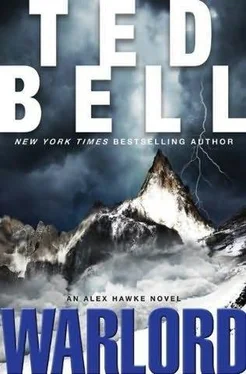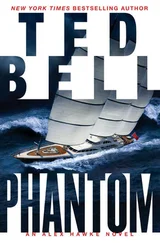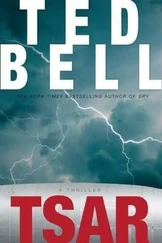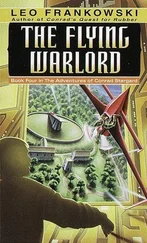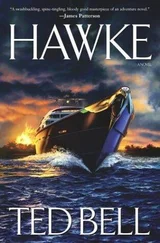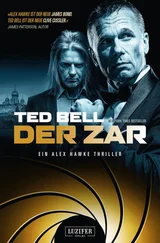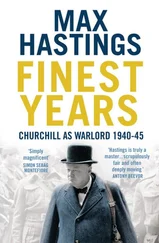"How many in the vehicle?"
"Just me sir. And a corpse in the rear."
"Destination?"
"Takim City," Imran said, naming the village of his birth. "The funeral is at sunrise."
Two soldiers were now at the passenger-side window, peering into the hearse with their weapons at the ready.
"We are going to search this vehicle. Keep your hands where I can see them and get out. Now."
"All right. Don't shoot. I'm getting out."
Hearing those words, Ali opened fire through the gun port, first taking out the sergeant standing outside Imran's window. Imran simultaneously raised the automatic shotgun and fired a long burst out the far window. The three or four soldiers outside simply disintegrated. He then floored the accelerator, using the trigger on the steering wheel to fire the twin.50-cal machine guns mounted behind the grille at soldiers blocking his way.
The soldiers returned fire, but the stunning surprise of an armed hearse caught many off guard and they died in a hail of bullets. Imran took a hard right turn and veered off the road, still accelerating in the sand as he headed straight for the barrier's end. Two armored vehicles opened up, but the rounds were no match for the Battlewagon's heavy armor and bulletproof glass. He did an end run around the barrier and, still firing the twin fifties, plowed through the mass of soldiers between him and the paved road. Ali, still at the gun port, was mowing down anyone in sight.
Throwing up a great wake of sand, the Battlewagon roared back onto the road north.
Six teams of two soldiers, mounted on powerful motorcycles with sidecars, were waiting for them on both sides of the road. As Imran desperately accelerated away, they tucked in behind him. Their powerful Kawasaki military motorcycles were more than fast enough to gain on the much heavier vehicle.
Soldiers in the armored sidecars began firing heavy machine guns at the escaping hearse, hundreds of rounds thudding off the armored rear door.
"They'll go for the tires next!" Imran shouted. "I'm lowering the platform, sire! Are you in position?"
"Go, go, go," al-Rashad screamed, and Imran knew that he was more than ready.
The platform lowered hydraulically, giving the Sheik time to get his hands on the weapon grips and triggers and slide forward onto the seat that swiveled with the gun itself. As soon as he felt the platform lock into place, he opened fire with the Gatling gun. The rotating barrels spat long, continuous jets of what looked like liquid fire. Since it was still dark, he could see exactly where he was shooting. He was methodical, first training his hail of lead on the motorcycle to his left. The thing was literally blasted off the road, exploding as it careened into the desert. Seeing the effect of this phenomenal weapon, the five other terrified riders began to brake and swerve.
The outcome for the five remaining motorcycles was immediate and devastating. Three more flaming machines went pinwheeling off into the desert on either side of the road, exploding into massive balls of fire that climbed fifty feet into the nighttime sky when their fuel tanks exploded.
"Our enemies are no more," al-Rashad announced proudly as he climbed out of the seat.
Imran raised the battle platform to its closed position and pushed the Battlewagon to its limits as he climbed the narrow rutted highway into the cold dark mountains. Now that they'd been identified, it was only a matter of time before the Predator drones and Cobra helicopter gunships would appear on the horizon along with the rising sun. Their own weapons useless against such enemies, Muhammad Imran knew it had now come down to a race against time. It was a race he had to win, and he flogged the Battlewagon like a demon out of hell up the twisting and deeply rutted road.
Forty minutes later, the somewhat battered Battlewagon, having encountered no aerial adversaries, rolled into a hidden cavern built into the side of a mountain by the Sheik himself over thirty years ago.
Waiting inside was a small army of veteran Taliban and al Qaeda fighters, Kalashnikovs slung over their shoulders, and many fine Arabian horses. The Sheik, protected by his men, would complete the journey to the secret stronghold on horseback, his precious cargo loaded onto the backs of the most primitive pack mules.
His cargo consisted of a small aluminum case measuring two feet by one and a half feet containing fissile material. The case weighed exactly 320 pounds. Inside this miniaturized nuclear device were a six-inch detonator and three coffee-can-sized aluminum canisters. Inside each canister was a single critical mass of plutonium (or U-235) at maximum density under normal conditions. To detonate, it was simply a matter of connecting all three and placing the device on a timer.
Or using a remote radio-controlled device.
The resulting explosion of this small case now strapped on a pack mule would be sufficient to take out the West End of London. Humans in the immediate vicinity would likely die from the force of the conventional explosion itself. Survivors of the blast would die of radiation poisoning in the weeks afterward. Those farther away might suffer radiation sickness in the days and weeks after, and some of them might recover.
Al-Rashad smiled at the irony of it all, watching the incredibly sophisticated nuclear device being unloaded from the aluminum coffin and transferred to the waiting mules. Donning his ancient desert garb, a woolen tunic over baggy trousers, he marveled at how absurd warfare had become in the new century. Weapons worth millions still had to traverse the rugged mountains on the backs of mules. And corpses in body bags mysteriously came to life and made more corpses.
He shrugged into his heavy bearskin coat, a gift from a long-deceased Soviet colonel, and swung up into the saddle. He bade farewell to Muhammad Imran and Ali who were climbing into the back of a white Toyota Hilux truck for the long ride back to Islamabad.
An hour later he was riding at the vanguard of his column of heavily bearded fighters, welcoming the warming sun to another day in this earthly paradise. He was at his best when returning home to his mountains, and he sat tall in the saddle, a broad smile on his deeply war-weathered face.
Wazizabad.
It was his home, his fabled fortress, his castle. And before the sun set this day on the faces of these much loved mountains, turned them pink in the dying light, he would return once more to the unassailable sanctuary that had defined his real world for as long as he could remember.
HAWKE HOVERED OVER THE SEVERELY wounded Pakistani Army officer in the cramped and bloodied rear of the military ambulance. The officer was still at the barricade, the scene of the horrific slaughter of many of his troops. Hawke had looked at the medic attending, and the man had looked back with a grave face, shaking his head no. The officer was obviously dying, but his dying words were of critical importance.
His voice broken and raspy, he strove mightily to tell Hawke what he needed to know. Upon learning of the bizarre hearse attack on the army barricade, Hawke and his team had immediately been airlifted to the scene by a CIA chopper pilot flying an unmarked Black Hawk. Hawke had no proof that Sheik al-Rashad had been inside that hearse, but he simply could not imagine it being anyone else.
"So, Captain, a black hearse, not a white ambulance, yes?"
"Y-yes…black…heavily armored."
"With weapons, you said. What will I be up against?"
"Fifty-caliber machine guns up front and…sorry, I can't seem to get enough…some kind of Gatling gun mounted at the rear…but…no concern of yours."
"No? Why?"
"This road north. It only lasts for…another hundred miles or so. Then…the…desert…and then the mountains."
Читать дальше
